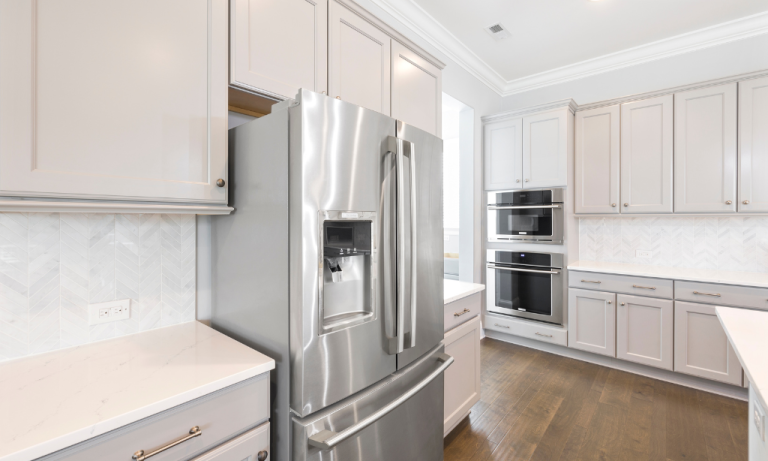Why is My Samsung Fridge Making Vibrating Noise? (Fixes!)
A refrigerator is an indispensable appliance in any modern household, ensuring the freshness and safety of our perishable goods. However, when a refrigerator, particularly a sophisticated model like a Samsung, starts emitting vibrating noises, it can be a cause for concern. These vibrations can not only be disconcerting but may also signal underlying issues within the appliance.
In this article, we will delve into the common problem of a Samsung fridge making vibrating noises. Understanding the root causes of these vibrations is crucial for maintaining the optimal performance of your refrigerator. We will explore various factors that can lead to these disturbances, ranging from improper leveling to issues related to essential components like the compressor and condenser fan.
By comprehending the significance of these vibrating noises and learning how to address them, you can ensure the continued efficiency and tranquility of your Samsung refrigerator. Let’s embark on a journey to demystify these vibrations and restore peace to your kitchen.
Significance of Vibrating Noises
Vibrating noises in a refrigerator are not to be taken lightly, as they can be indicative of underlying issues that may lead to more significant problems if left unaddressed. It’s crucial to differentiate between normal operational sounds and abnormal vibrations:
A. Differentiating Between Normal Operational Sounds and Abnormal Vibrations
- Normal Sounds: Refrigerators often produce low-level hums, clicks, and occasional gurgles as part of their regular operation. These are associated with components like the compressor, fan, and refrigerant flow.
- Abnormal Vibrations: Vibrations, on the other hand, are distinct physical movements or oscillations felt or heard in the fridge. These can indicate imbalances, loose components, or issues with critical systems.
B. Potential Consequences of Ignoring Vibrating Noises in a Refrigerator
1. Component Wear and Tear: Continuous vibrations can lead to premature wear and tear on various internal components, potentially shortening the lifespan of the refrigerator.
2. Reduced Efficiency: Vibrations may disrupt the proper functioning of components like the compressor and fan, affecting the refrigerator’s overall efficiency and energy consumption.
3. Escalation of Problems: Ignoring vibrating noises can allow minor issues to escalate into more significant, and potentially costly, problems that may require professional intervention.
Common Causes of Vibrating Noises in a Samsung Fridge
When a Samsung fridge starts emitting vibrating noises, it’s important to identify the root causes promptly. Here are some common factors that can lead to these disturbances:
A. Improper Leveling and Stability Issues
- Description: Rattling or vibrating noises, particularly when the compressor cycles on or off.
- Explanation: If the Samsung refrigerator is not properly leveled, it may rock or vibrate when in operation, leading to noisy disturbances.
B. Vibrations Due to Compressor Operation
- Description: Intense vibrations, often accompanied by a noticeable hum, during compressor cycles.
- Explanation: The compressor is the powerhouse of the refrigerator, and its operation can lead to significant vibrations. Excessive or irregular vibrations may signal an issue.
C. Condenser Fan-Related Vibrations
- Description: Clicking, buzzing, or squealing noises from the area around the condenser coils.
- Explanation: A malfunctioning or dirty condenser fan can produce abnormal vibrations. This fan assists in dissipating heat from the coils.
D. Loose or Misaligned Components Causing Rattling
- Description: Rattling or vibrating noises, often associated with the movement of internal components.
- Explanation: Loose or misaligned parts within the refrigerator, such as shelves, drawers, or door bins, can generate noise and vibrations during operation.
Addressing Improper Leveling and Stability Issues
Improper leveling and stability can be significant culprits behind the vibrating noises in a Samsung fridge. Correcting these issues is essential for a quieter and more efficient refrigerator. Here’s how you can address them:
A. How to Check and Adjust the Level of a Samsung Fridge
- Gather the Necessary Tools: A bubble level. Adjustable wrench or pliers
- Locate the Leveling Legs: These are usually situated at the front corners of the fridge near the floor.
- Check the Level: Place the bubble level on top of the fridge from side to side and front to back. Observe the bubble to determine if the fridge is level.
- Adjust the Leveling Legs: Use an adjustable wrench or pliers to turn the legs clockwise to raise them or counterclockwise to lower them.
- Recheck the Level: Place the bubble level back on top and recheck. Continue adjusting as needed until the fridge is level.
B. Using Leveling Legs or Feet to Stabilize the Refrigerator
- Ensure Proper Contact with the Floor: Confirm that all leveling legs are in contact with the floor. If not, adjust them until the fridge is stable.
- Prevent Rocking Motion: Gently rock the fridge from corner to corner to test for stability. If it rocks, adjust the leveling legs accordingly.
- Verify Stability with the Door Open and Closed: Open and close the door to ensure the fridge remains stable and does not wobble.
C. Tools Required for Proper Leveling
- Bubble Level: Ensures accurate assessment of the fridge’s level.
- Adjustable Wrench or Pliers: Used to turn the leveling legs for adjustments.
Compressor-Related Vibrations
The compressor is the powerhouse of a refrigerator, playing a pivotal role in the cooling process. It works by compressing refrigerant gas, which raises its temperature and pressure. This high-pressure gas is then circulated through the condenser coils, where it releases heat and transforms back into a liquid state.
This process is essential for maintaining a cool interior temperature. However, the operation of the compressor can lead to significant vibrations, especially during its cycles. These vibrations are generally normal and expected.
However, if the compressor is malfunctioning or experiencing excessive strain, it may produce more pronounced and irregular vibrations. In such cases, it’s important to address the issue promptly to prevent further damage and ensure the efficient operation of the refrigerator. Regular maintenance and occasional inspections can help identify and resolve any compressor-related problems that may lead to vibrating noises.
Dealing with Vibrations from the Condenser Fan
The condenser fan is a crucial component of a refrigerator’s cooling system, responsible for dissipating heat from the condenser coils. When functioning properly, it ensures efficient cooling performance.
However, a malfunctioning or dirty condenser fan can lead to abnormal vibrations and noises. Over time, dust and debris can accumulate on the fan blades, causing imbalance and irregular operation. This imbalance can manifest as clicking, buzzing, or squealing noises.
Additionally, a faulty fan motor may produce vibrations due to irregular rotation. To address vibrations from the condenser fan, regular cleaning and maintenance are essential. Clearing away any accumulated debris and ensuring the fan blades rotate freely can significantly reduce vibrations and restore smooth operation.
In cases where the fan motor is damaged or malfunctioning, replacement may be necessary to eliminate the source of the vibrations. Regular maintenance of the condenser fan is a crucial step in preventing potential issues and ensuring the efficient and quiet operation of your refrigerator.
Rectifying Loose or Misaligned Components
Loose or misaligned components within a refrigerator can be a significant source of rattling and vibrating noises. Shelves, drawers, and door bins that are not securely in place can shift during the refrigerator’s operation, causing disruptive sounds.
Over time, wear and tear can lead to components becoming loose or misaligned. To rectify this issue, it’s important to conduct regular inspections of the internal parts of the refrigerator. Tightening any loose components and ensuring that shelves and drawers are properly aligned can go a long way in eliminating these noises.
In cases where components are damaged or worn out, replacement may be necessary to restore stability and silence to the refrigerator. By addressing loose or misaligned components, you not only reduce noise levels but also contribute to the overall efficiency and longevity of your Samsung fridge.
People Also Ask
Is it normal for a Samsung fridge to vibrate?
While a certain amount of vibration is normal due to the operation of components like the compressor and condenser fan, excessive or irregular vibrations can be indicative of underlying issues that require attention.
What are common causes of vibrating noises in a Samsung fridge?
Common causes of vibrating noises in a Samsung fridge include improper leveling, compressor-related vibrations, issues with the condenser fan, and loose or misaligned internal components.
How can I check if my Samsung fridge is properly leveled?
You can use a bubble level to check if the fridge is level from side to side and front to back. Adjust the leveling legs as needed to ensure stability.
How often should I clean the condenser fan of my Samsung fridge?
It’s advisable to clean the condenser fan of your Samsung fridge at least once every six months. However, if you notice any excessive dust or debris accumulation, more frequent cleaning may be necessary.
Can I fix loose components in my Samsung fridge myself?
Yes, you can tighten loose components like shelves, drawers, and door bins in your Samsung fridge yourself. Regular inspections and maintenance can help prevent these issues from occurring.
When should I seek professional help for vibrating noises in my Samsung fridge?
If the vibrating noises persist or are accompanied by other concerning signs, it’s advisable to consult a certified technician. They have the expertise to diagnose and address more complex issues related to the refrigerator’s components.
Is it safe to continue using my Samsung fridge if it’s making vibrating noises?
While some vibration is normal, if the noises are excessive or irregular, it’s best to address the issue promptly to prevent potential damage to the refrigerator’s components. If in doubt, consult a professional technician.
Conclusion
Taking proactive measures, such as leveling the fridge, cleaning the condenser fan, and securing internal components, can greatly reduce or eliminate these disruptive noises. Regular maintenance and timely intervention are key to ensuring the continued efficiency and longevity of your Samsung fridge.
As an Amazon Associate I earn from qualifying purchases.
- Can You Put Clouds Shoes in the Washing Machine? With Tips & Tricks - April 10, 2024
- European Washing Machine vs American – History, Design, Technology - March 27, 2024
- Can You Put Boxing Gloves In The Washing Machine? – Expert Tips - March 25, 2024


![Frigidaire Refrigerator Temperature Control Problems [Problems Solved]](https://homeplacetips.com/wp-content/uploads/2023/11/Refrigerator-Thermostat-Testing_000038290-768x432.webp)

![Frigidaire Vs Whirlpool Refrigerator [Which Is the Best?]](https://homeplacetips.com/wp-content/uploads/2023/10/Bosch-Vs-LG-Refrigerator-768x512.webp)
![Frigidaire Refrigerator Control Board [Troubleshooting Guide]](https://homeplacetips.com/wp-content/uploads/2023/11/Frigidaire-Refrigerator-Repair-No-Power-Power-Control-Board_000113387-768x432.webp)
![Whirlpool Gold Refrigerator Not Making Ice [Troubleshooting Guide]](https://homeplacetips.com/wp-content/uploads/2023/10/Whirlpool-Gold-Refrigerator-Not-Making-Ice-768x461.png)
